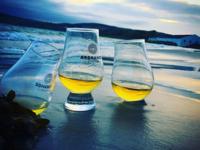What is a Single Estate Whisky?
Contents

With a single estate whisky, all the raw materials come from the immediate vicinity of the distillery. The distilling grain is grown and malted in-house, the distillation takes place in our own stillhouse and the whisky is barrel matured in our own warehouses on the premises. From the field to the bottle, the motto for a single estate whisky is logical. We present the special whisky variety with its properties.
A term with no legal definition
An important point in advance: The single estate whisky variety is not defined or protected by law, so it can be used freely by distilleries. And so there are very different distillates that are offered under the Single Estate label. Connoisseurs should therefore take a close look at what exactly the distillery in question does itself and how these steps differ from other distilleries.
Origin of the phrase
The first instance of single estate whisky in Scotland seems to have been Ballindalloch in 2014, though the term has been used for years by rum producers and has taken root in America as well. In the main this seems to be whiskies version of ‘craft’. Though much like the term craft it’s meaning is somewhat ill defined as the massive Macallan distillery has now produced its own Macallan Estate.
Features of single Estate Whiskies
Terroir has long been recognised as an essential element in the wine industry. It is the idea that the local ecosystem in which a crop is grown greatly influences the final quality and flavour profile. While this concept has been largely rejected due to the industrial way most whisky is produced (not withstanding the role of peat) the exponential growth in popularity of single whisky has lead to some distilleries laying claim to the concept of terroir in relation to their single estate whiskies.
The Distillery
Many single estate distilleries are located on an estate or farm. There are practical reasons for this: If you want to grow your own barley or other grain for distilling whisky, you need enough space and good soil conditions.
Malting
There are already differences when the barley germinates. While some distilleries carry out this complex step themselves on their own malting floors, other distilleries rely on external malt houses in the area. These are specialized in the production of barley malt and deliver consistent quality according to predetermined specifications.
Distillation
Most single estate whiskies are essentially single malts , which are distilled twice (sometimes three times) in copper stills. But rye whiskies and other varieties are also offered as a single estate variant.
Maturation
It gets exciting when it comes to storage: while many Scottish whiskies are transported to centrally located high-rack warehouses after distilling , single estate whiskies generally mature in the immediate vicinity of the distillery. Traditional three tier dunnage warehouses are often used for this, but taller and more modern warehouses are also possible.
The terroir
Behind the current trend towards single estate distilleries lies the idea of the whisky terroir : The representatives of this concept are convinced that the water, the barley, the yeast, any peat and the storage affect the taste of the whisky not only have an impact, but rather shape it regionally. In this sense, the idea of the single estate as the place of origin of the entire whisky from the field to the bottle is the direct continuation of the terroir idea, which has been in vogue for several years.
Single Estate distilleries at a glance
Since its inception in 2014, Ballindalloch has promoted itself as a single estate distillery. This unique selling point is argued as by the owner, Guy Macpherson-Grant, because the distillery uses barley grown on the family’s estate. However neither it, nor Arbikie in Angus or Lochlea distillery in Kilmarnock malt their own barley on site. Were it not for the fact that only a handful of distilleries actually have their own maltings this entire arguement would be untenable.
Arbikie Highland Estate Distillery
The young Arbikie distillery is located in the north-east of the Scottish Highlands on a 2,100 hectare estate. The Single Estate Distillery is run by three brothers, who grow different types of barley and other grains around the distillery themselves and cultivate the fields. The malting takes place at a supplier in the neighboring town. In addition to single malt whisky made from barley malt, a rye whisky made from rye is also distilled. Maturation takes place in warehouses on the estate. The single malt should carry the full-bodied maritime style of the Coastal Highlands.
Ballindalloch Distillery
In the middle of picturesque Speyside, Ballindalloch distills its single estate whiskies. The 2014 distillery was the first start-up in Scotland to claim the term single estate. The barley for Ballindalloch’s whisky is grown in the fields surrounding the small farm buildings but is not malted on site. However, the whisky is distilled and stored in the casks on site. The whisky should taste robust and full of character.
Lochlea Distillery
The fledgling Lochlea Distillery is just a few miles south of Glasgow. The farm building that now houses the distillery has a long history. Scotland’s national poet Robert Burns lived and worked here from 1777 to 1784. The grain for the production of the whisky is grown on the surrounding fields and the maturation of the whiskies in mainly bourbon barrels and sherry casks takes place completely locally. None other than John Campbell (formerly Laphraoig) could be won as Master Blender.
FAQs
What defines a whisky as single estate?
There is no legal or even single, unifying designation for a single estate whisky. However in general the spirit is defined as being field-to-bottle. The term, like the concept of terroir as applied to whisky is the result of the desire of the producer to grow, harvest, mash, ferment, distil, dilute and even bottle their own spirit, and from drinkers who value high-quality ingredients and authentic production methods

